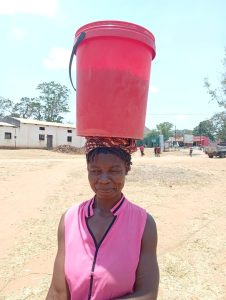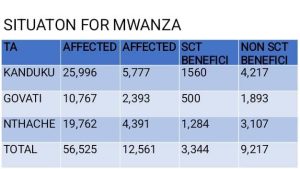It was around midday when Ebileti Mikayero was seen hurrying along a dusty road in Mwanza District, balancing a small sack of maize flour on her head. The mother of five had just returned from the market, where she managed to buy the flour after pooling together the little money her family had left.
“We only managed to buy one bucket of maize flour, which might sustain us for two to three days, as a family of seven…I’m not sure when we will have money again to buy more,” she said.
Like most families in the district, Ebileti’s household depends on nsima, which is Malawi’s staple food.
However, the prolonged dry spell that affected crops in the previous farming season has left many homes struggling to afford even a single meal a day.

A few meters away, Mayidemu from Mchotseni Village was also returning from a similar errand; a bucket of maize flour balanced on her head. She said the past few months have been the hardest she can remember.
Throughout the years, the two families have never benefitted from food relief programmes in the past.
“We only hear that people are receiving food but it never reaches us, I just hope this time will be different,” said Mayidemu.
The two women represent thousands of households in Malawi facing hunger due to the effects of dry spells and unpredictable rainfall patterns.
According to Mwanza District Disaster and Risk Management Officer, Ivy Chammudzi, over 12,500 households in the district have been affected by food shortages and plans are underway to commence maize distribution exercise.

“The district needs about 3,768 metric tons of maize to reach all affected families for a period of six months,” Chammudzi said.
Recently, President Professor Arthur Peter Mutharika declared a state of disaster in 11 districts severely affected by food shortages caused by dry spells.
The affected districts include Blantyre, Chikwawa, Lilongwe, Mulanje, Mwanza, Neno, Nkhotakota, Nsanje, Phalombe, Salima, and Thyolo.
Minister of Agriculture, Roza Mbilizi on 01 November 2025, launched the 2025/2026 Lean Season Food Insecurity Programme targeting the most vulnerable families in the hardest-hit districts.
“No one will die of hunger; government is implementing all the necessary measures to ensure food availability,” said Mbilizi.
Meanwhile, an agricultural expert has pointed out that for long term, the country needs to do more to boost agriculture as the rainy season approaches.
Tamani Nkhono-Mvula said it is high time the government started shifting from programmes that depend on rain-fed agriculture owing to their vulnerability to drought, given the country’s changing climate trends.
“There is little investment in irrigation farming and alternative crops like cassava, which are more tolerant to climate shocks,” he said. “Without diversification, Malawi will continue facing the same food crises year after year.”
By Catherine Alumando, Mwanza



